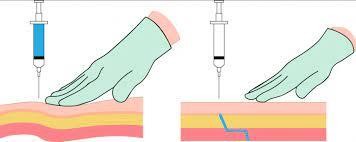A client has had an uncomplicated repair of an inguinal hernia. On the second post- operative day, the client has mildly elevated temperature and general malaise. The nurse recognizes that this is a generalized body response which is common to which phase of healing?
Inflammatory
Proliferation
Remodeling
Infection
The Correct Answer is A
Choice A rationale: An inflammatory response, including mild fever and malaise, is common during the inflammatory phase of healing, which occurs in the initial postoperative period.
Choice B rationale: Proliferation is the phase of healing characterized by tissue repair and regeneration, not by fever and malaise.
Choice C rationale: Remodeling is the final phase of healing involving tissue maturation and strengthening, not associated with generalized body responses.
Choice D rationale: Infection is a separate complication and may present with more severe symptoms than mild fever and malaise.
Nursing Test Bank
Naxlex Comprehensive Predictor Exams
Related Questions
Correct Answer is C
Explanation
Choice A rationale: Under-delegation is not related to giving too much responsibility to assistive personnel; it is about appropriate delegation based on the nurse's assessment of the situation.
Choice B rationale: Trust in delegates is essential, and under-delegation is more likely related to a lack of trust or confidence in delegation.
Choice C rationale: Under-delegation can occur due to a nurse's need for perfectionism and control, leading to a reluctance to delegate tasks to others.
Choice D rationale: Nurses often have heavy workloads, and under-delegation may be a result of feeling there is not enough time to delegate effectively.
Correct Answer is B
Explanation
Choice A rationale: Using a small gauge needle may reduce pain but does not specifically address tissue irritation.
Choice B rationale: The Z-track method is used to reduce irritation and prevent leakage of irritating medications into the subcutaneous tissues.
Choice C rationale: Administering at a 45-degree angle is a common angle for intramuscular injections but does not specifically address tissue irritation.
Choice D rationale: Applying ice to the injection site is not a standard practice for reducing tissue irritation with intramuscular injections.

Whether you are a student looking to ace your exams or a practicing nurse seeking to enhance your expertise , our nursing education contents will empower you with the confidence and competence to make a difference in the lives of patients and become a respected leader in the healthcare field.
Visit Naxlex, invest in your future and unlock endless possibilities with our unparalleled nursing education contents today
Report Wrong Answer on the Current Question
Do you disagree with the answer? If yes, what is your expected answer? Explain.
Kindly be descriptive with the issue you are facing.
